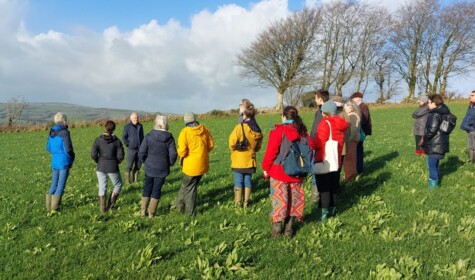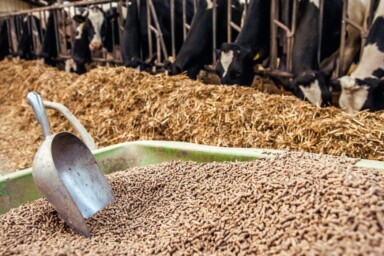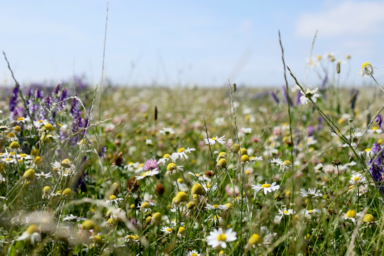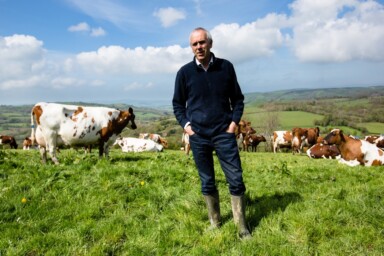The Wales Real Food and Farming Conference, which took place in Lampeter, November 23 – 25, had a super successful return to the live stage, with a hip-hip-hurrah to meeting up, talking shop and sharing thoughts on the future of sustainable farming and food in Wales. While the online Conferences of 2020 and 2021 were rich with content and conversations, we were all getting a little tired of living on ZOOM, and returning to the real face to face was a welcomed by all.
This year’s WRFFC landed in Lampeter, held at the University of Wales Trinity St David, Lampeter campus. The University has been raising the stakes in Lampeter with the instigation of the Canolfan Tir Glas project. This multi-faceted project comprises diverse elements working to bring opportunity and community together. The most noted of these is the development of an Academy of Contemporary Food Wales, the focus of which reaches beyond the idea of just the Academy to engagement with the wider potential of Welsh food across the country.
Sheila Dillon of Radio 4’s Food Programme opened the Conference with eloquence and thoughtfulness, reflecting on “how did food and farming get so unreal” that it requires a gathering to discuss ‘real’ food and farming? How did we lose our way and drift into a food system that offers the opposite of good health – what has happened here? Dillon asserts that “It’s the first food system that’s designed to make us sick”. This rise of ultra-processed food is integrally connected to the monocropping and use of nitrogen fertiliser and pesticides in industrial farming that are at the root of our biodiversity loss. While our food system is supremely efficient and profitable, it is beneficial only to huge corporate companies. But says Dillon, the industrial system is fracturing and there is a new movement afoot – “The food world is changing, and it’s changing fast”.
Dillon also chaired the session on Feeding Wales from the Ground Up, with SFT CEO Patrick Holden, grower Peter Segger, Rachael Madeley Davies, Hybu Cig Cymru and Jyoti Banerjee. Based around the recently published report by the Sustainable Food Trust, Feeding Britain from the Ground Up, the session honed in on the question of how to align diets with what can be produced in Wales, asking ‘what should we be eating to be healthy and sustainable?’
Alun Elidyr, the keynote on the second day of the Conference, spoke in conversation with broadcaster Jon Gower in a lively, funny and engaging exchange around the trials and tribulations of being a Welsh farmer. A former actor and now presenter of the television programme Ffermio, he has seen agri-environmental schemes come and go and takes an equally sceptical view of government policy and the fervour of the organic and regenerative farming movements. Nevertheless, he spoke eloquently of a food production system that is embedded in nature and local culture.
There was a broad array of topics to explore across the two days. A Climate of Change: Setting the Trajectory Towards a Flourishing Anthropocene, chaired by David Bavin, was the first session of the Conference. It asked what can we do to change tack and set a new more positive trajectory towards meaningful change in our food system, ecosystems and relationships, even as we face climate change.
Food leadership, food partnership and food culture were all strong themes running through the sessions. Carwyn Graves and Patrick Holden considered Welsh food in a lively free-form riff, considering the past and possible futures it might hold. The potentiality of community food to play a bigger role both in feeding people, but also in bringing them together on a social level, was an important theme along with questions of land access and how we make literal space for this on the ground.
Sustainable and nature friendly farming was also a focal point of discussion. The question of land sparing versus land sharing continues to be an ongoing debate, though there is growing recognition in Wales that farming can and does support nature, arguably much more effectively than in a land sparing model. The RSPB’s recent film exploring the value of land sharing in supporting biodiversity was launched at the Conference and it is well worth a watch.
The Nature Friendly Farming Network session on Nature Means Business further highlighted the value of nature in farm profitability and the Woodland Trust session looking closely at the Sustainable Farming Scheme similarly explored the ways that farming can work with the environment and nature in important ways. There is a clear drive to engage farmers in practices that are more widely beneficial to the environment and nature and to take a broader holistic perspective on their farming.
Such gatherings as the Conference are so important in opening up wider dialogue between diverse groups of people that care deeply about the same shared issues but move in different circles. Bringing together the gamut of people – farmers, food producers, academics, cooks and chefs, local authorities, ministers and others – who need these conversations is a critical step in transforming the nature of our food system.






